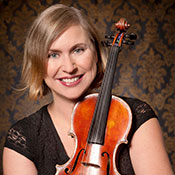
Robert Levine: From computer scientist to Principal Violist
David Lewellen
PUBLISHED
Tagged Under: MSO Musicians, Musician, Viola
When Robert Levine didn’t feel like becoming a computer scientist, his next option was the viola.
Levine, who is finishing his 31st season as the Milwaukee Symphony’s principal viola this July, majored in computer science at Stanford, and spent one summer with IBM as a high school student, in the punch-card era of computing. He worked on a computer in Palo Alto that talked to a computer in New York – in the 1960s. “It wasn’t the internet,” he says. “It was a wooden box. You would pick up the phone, dial the New York number, jam the receiver in the box, and close it. And there was a big old disk drive, which was an improvement over the tapes. It was like LPs stacked ten deep, and it was five megs of memory – like two photos on your iPhone. To see what’s happened in that field – people just don’t remember.”
But after graduating from Stanford, he was at a loose end. He got a few professional viola gigs, spent a year at graduate school, and finally won a job as principal violist in the St. Paul Chamber Orchestra, and then in Milwaukee. The career path is “a little unusual,” Levine admits. “But fortunately, no one cares where you’ve been to school. It’s how you do at the audition.”
The life of a violist rarely includes solo opportunities, but later this month Levine will perform Flos Campi by Ralph Vaughan Williams — a natural fit with Ravel’s Daphnis and Chloé on the second half of the program, since Vaughan Williams studied with Ravel and absorbed some of his influence.
But speaking of the limited solo repertoire for viola, Levine said, “I’m not interested in doing the Walton or the Bartók. I’m not interested in learning a piece I don’t like.” The Vaughan Williams, however, “is beautiful. It’s not bombastic; it’s just a little gem. The hardest part is for the chorus. They’ve got very little to hang onto” to find their pitch. That’s why, he continued, it’s a good fit for this orchestra, with the services of the Milwaukee Symphony Chorus.
And the whole concerto fits in with the viola’s role as a team player within the string section. “It’s not, ‘I’m leading, follow me.’ It fits in with what’s going on,” he says of the solo part. “Maybe that’s what I like about it.”
In his spare time, he likes to read about history and to sail; he is a volunteer instructor at the Milwaukee Community Sailing Center. He lives in Glendale with his wife, Emily, executive director of the Autism Society of Southeast Wisconsin, and their adult son.
Levine also leads the Milwaukee local of the American Federation of Musicians and has been a union activist for much of his career. The first computer he ever owned was the original Macintosh, in 1984, so that he could analyze the St. Paul orchestra’s finances on a spreadsheet program.
In Milwaukee, Levine says that since an 18-month work dispute in the early 1990s, relations between musicians and management have been unusually positive. The current contract expires at the end of this season, and negotiations are underway for the next one. “They’re not asking for anything stupid, and we’re not asking for anything stupid,” Levine said. “There’s a lot of continuity on both sides, and that’s very important. People just get better at bargaining.”
“He’s a wonderful stand partner, very knowledgeable, very experienced,” said MSO assistant principal violist Nicole Sutterfield. “He takes his job seriously, but he doesn’t take himself too seriously, and that’s a good combination. We’re a good section, largely due to his leadership.”
Looking ahead, Levine hopes to keep playing at least until the MSO’s scheduled move into its new hall in the fall of 2020. “But that’s never totally in our control,” he adds. “The viola section is a wonderful group of people. In fact, the whole orchestra’s like that. I don’t know how we did that – we don’t screen for that – but I’m glad we’ve kept the character of our orchestra positive. People want to work here and play well and get along.”



